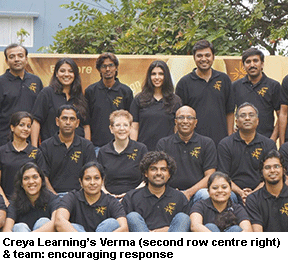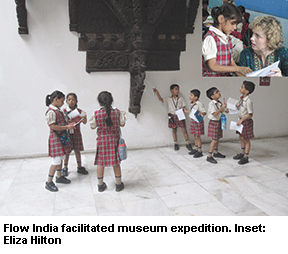Fortunately for progressive parents and school managements, a rising number of edupreneurs have developed supplementary and experiential education programmes to enrich school curriculums and develop cognitive skills
 IF FOUNDATIONAL EARLY childhood care and education in contemporary Indian education is in its infancy due to sustained government neglect, the primary education scenario is not much better, for the same reason. It’s tragic but true that the vast majority of the country’s 1.20 million primary schools established and managed by the Central, state and local governments are in a shambles.
IF FOUNDATIONAL EARLY childhood care and education in contemporary Indian education is in its infancy due to sustained government neglect, the primary education scenario is not much better, for the same reason. It’s tragic but true that the vast majority of the country’s 1.20 million primary schools established and managed by the Central, state and local governments are in a shambles.
Government primaries are characterised by ramshackle buildings with leaking roofs, multi-grade classrooms, and to tend to be bereft of fans, electricity, safe drinking water, useable if any, toilets. Moreover they suffer mass teacher truancy, with typically 90 percent of budgetary outlays absorbed by the remuneration of teachers and staff who often don’t report for work — 25 percent of the country’s 8 million government school teachers are absent every day. Sustained neglect of primary education is the prime cause of the mass unemployment, low wages and rock-bottom productivity of Indian industry and agriculture. According to the Annual Status of Education Report 2013 of Pratham — India’s most-respected NGO — 58.9 percent of class V children in government rural primaries can’t read and comprehend class II texts and 75 percent can’t do simple division sums.
The saving grace of K-12 education in post-independence India, are the country’s 80,000 ‘recognised’ private primary-secondaries (200,000 according to the Union HRD ministry which computes the primary, secondary and higher secondary sections of composite schools as separate units) and an estimated 300,000 ‘unrecognised’ (by state governments) private budget schools — typically privately-promoted slum primaries offering English language learning — in which the aggregate enrolment adds up to more than 50 percent of India’s primary school-going children. However, even in the great majority of private primary-secondaries, academic standards suffer in comparison with global benchmarks mainly because schools are obliged to follow syllabuses and curriculums of examination boards which prepare students for entry into academically backward government colleges and higher education institutions rarely in sync with the needs of Indian industry, agriculture or the services sector.
CONSEQUENTLY THE ONLY option of parents and school managements who want to prepare students for higher education and post-collegiate job markets, is to ensure their children are provided with enriched, value-added supplementary education which improves their thinking, logic and problem-solving skills which will not only help them score well in school board exams but also stand them in good stead in higher education and employment thereafter. Fortunately for such progressive parents and forward-looking school managements, a growing number of edupreneurs have developed and are marketing supplementary and experiential education programmes which enrich school curriculums and develop the cognitive skills of students.
A primary-secondary curriculum enrichment and development company which is fast earning a good reputation for providing cognitive skills enhancement programmes is the Hyderabad-based Creya Learning Pvt. Ltd (CL). Promoted in 2011 with the objective of making “learning relevant for children in the 21st century”, CL partners with schools to integrate “21st century skills” into classroom curriculums and introduces students to constructivism, STEM (science, technology, engineering and math), design thinking and collaborative learning. Under a whole-school subscription business model, students are charged an annual fee ranging from Rs.1,500-4,500 per child and provided innovative “learning spaces” where they can “construct their own knowledge by making, tinkering and learning through inventions”.
According to company spokespersons, Creya’s learning enhancement programmes are mapped with the National Curriculum Framework prescribed by the Delhi-based National Council of Educational Research and Training (NCERT), which makes them compatible with schools affiliated with all examination boards — CBSE, CISCE, and state boards. Creya Learning also offers programmes aligned with the IB and CIE curriculums.
“Our partner schools are very satisfied with Creya and they have been nudging us, giving us ideas and demanding more from us to help them integrate our programmes into their school curriculums. The use of Creya programmes varies between 30-240 hours per class per year. At 240 hours, the share of our programmes adds up to 25 percent of a school’s curriculum, and gives us great satisfaction,” says Hari Verma, an alumnus of Andhra University and NITIE, Mumbai who acquired valuable work experience with Tata Technologies in India and Singapore and with Knowledge Universe, USA before promoting Creya Learning three years ago.
Since then, CL has signed up 50 schools with 22,000 students. “The response of school leaders and managements to our curriculum enrichment and skills development programmes is very encouraging and we have set ourselves a target of 160 schools and 100,000 students by June 2015,” he adds. 
Curriculum enrichment through experiential learning is also the aim and objective of Flow India Education & Culture Consultants Pvt. Ltd (estb. 2010), which has introduced “international museum learning approaches” to K-12 education in India. “We connect children to their heritage, environment and culture to build their capacity to evaluate, think and learn better. This will equip them for work and life in the 21st century,” explains Eliza Hilton, alumna of Oxford University and the School of Oriental and African Studies, London who taught in the UK and served with the Aga Khan Foundation in Afghanistan and the UK for five years before co-promoting the Delhi-based Flow India. Over the past three years, the company which has a full-time faculty of seven aided by 30 part-time facilitators drawn from the fields of art, historical research, environmentalism and performing arts, has grown its clients base to 30 schools mainly in Delhi and its environs, and reaches 15,000 children.
Typically this education enrichment firm offers an initial introductory three-day workshop (Rs. 600-1,200 per child) covering chosen curriculum topics with interactive discussions-based activities and questioning encouraged, and topped with a facilitated field visit to a museum, or historical monument. “Our spiral integrated creative enquiry curriculum across science, history, civics and arts prompts self-evaluation, creativity, expressive language and 21st century learning. It has a huge impact on schools, teachers and students. We are also working with schools in Lucknow, Indore and Ranchi this year and are looking to work with many more in the next academic session,” says Hilton.
.gif) Fortunately, science subjects which are the bane of millions of students countrywide because of the unimaginative way in which they have been taught in India’s 1.40 million primary-secondaries from time immemorial, are also attracting the attention of innovative edupreneurs. In 2007, Gagan Goyal, a mechanical engineering alumnus of IIT-Bombay, promoted ThinkLABS Pvt. Ltd soon after graduation.
Fortunately, science subjects which are the bane of millions of students countrywide because of the unimaginative way in which they have been taught in India’s 1.40 million primary-secondaries from time immemorial, are also attracting the attention of innovative edupreneurs. In 2007, Gagan Goyal, a mechanical engineering alumnus of IIT-Bombay, promoted ThinkLABS Pvt. Ltd soon after graduation.
“thinklabs was born out of my passion for robotics and the experiential leaning I gained through participation in robotics competitions in India and the US. Soon after launching the company with a modest paid-up capital of Rs.2 lakh, the encouraging response we received from schools across India indicated that robotics could precipitate a major shift in the primary-secondary schools eco-system as it teaches STEM (science, technology, engineering and maths) subjects and computer science in an experiential way, in a manner no other form of learning can,” recalls Goyal.
Unsurprisingly since then the company, which offers the option of hands-on, experiential science and related subjects learning, has grown impressively (annual revenue: Rs.10 crore). Its two experiential robotics learning programmes — Robolab and Eureka — are being taught to 54,000 students in 350 schools in 100 cities across India, as also in 32 schools in the UAE and South Africa. “In our last edition of TRiCKS, our national robotics championship, we attracted the participation of students from 35 cities across the country with all the winners being from tier-II cities. This has proved to us that our robotics learning programmes are acceptable in all geographies,” says Goyal.